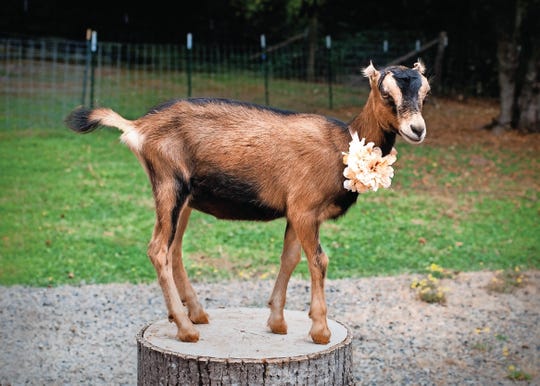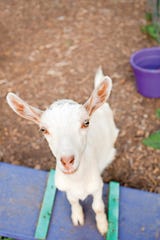Oberhasli/La Mancha cross breed goat (Photo: Feather Photography)
The New York Times style section declared 2017 the Year of the Goat, and TheOutline.com, a website that tracks internet trends, named goats the “hottest cultural trend” of 2018. Will 2019 be the year that goats join dogs, cats and parrots in the small pantheon of animals that have made the leap from wild to domesticated?
Traditional pets clearly don’t need to worry about being displaced just yet by these adorable horned and hoofed creatures, but goats are making inroads. According to the American Goat Society, the number of registered Nigerian Dwarf goats — one of the breeds most recommended as pets because of their small size — grew about 8 percent between 2014 and 2017.
If the current goat craze had a Big Bang moment, it was in the spring of 2016 on a farm in Oregon, where the idea of goat yoga (doing yoga while goats roam around you and sometimes on you) was born. Goat yoga went viral, and soon there were many offshoots, including golf with goats and a Goatel, an Oregon retreat center offering various forms of goat therapy. There are YouTube channels devoted to quirky goat videos, including those starring Pismo and Goatee, a pair of surfing goats in California (yes, they actually surf). Instagram has made minor celebrities out of many goats (some accounts have hundreds of thousands of followers), partly by dressing them up in outrageously cute outfits.
Saanen breed of goat (Photo: Feather Photography)
One of the more popular goat-centric Instagram accounts, @rescuegoats, is run by Puget Sound Goat Rescue in Maple Valley, Wash., which annually rescues about 200 goats in the Seattle area (many of whom were destined for a slaughterhouse) and finds families to adopt them. Barbara Jamison, owner and director of the organization, rigorously screens prospective goat parents through a process that includes home visits to make sure people have the appropriate setup.
“We are careful about where our goats go. We don’t just adopt them to anybody who suddenly decides they want a pet goat,” says Jamison. “There’s this whole wave on the internet of goats running around in pajamas in people’s houses like it’s all good, but the reality is these are farm animals.”
The most important thing to know about adopting a goat, says Jamison, is that you must adopt at least two: Herd animals are profoundly unhappy when alone. Space to roam and forage is essential; she recommends a minimum of a quarter acre for a pair of full-size goats and an eighth of an acre for a pair of dwarf goats — small urban yards simply won’t do.
They will also need a predator-proof, but well-ventilated shelter for sleeping and hanging out in bad weather. Goats are talented escape artists, so plan on sturdy 4-foot fencing, with wire mesh that extends 12 inches into the ground to thwart any coyotes or dogs that might try to dig under. While there is no shortage of goats doing cool things on Instagram, Jamison says goats are next to impossible to house train and, like their ancestors in mountainous regions of the world, instinctively climb to the highest point around — she suggests keeping them outdoors unless you don’t mind them jumping on the dinner table.
Laurie Hess, an exotic pet veterinarian in Bedford Hills, N.Y., says that while goats are fairly hardy animals; they are prone to intestinal parasites, especially if their quarters are not cleaned regularly. Hooves need trimming every few weeks, but otherwise grooming needs are minimal. She recommends adopting de-horned goats as a safety measure if they will be around small children.
Goats’ reputation as stinky, ornery animals pertains to uncastrated males, which indeed develop a rank odor once they are sexually mature. “Intact bucks are aggressive and destructive,” says Hess, who recommends adopting females or neutered males. Also keep in mind that most vets, even those that specialize in exotic pets, do not treat goats, she says. Often a drive into the countryside is necessary to find a farm vet if your goat needs medical attention.
Goats have a profound desire to eat every bit of foliage in sight, so their fenced home must be separate from landscaped areas and free of any poisonous plants. This trait also makes it difficult to walk a goat like you would a dog — they will constantly pull on the leash in an effort to get at your neighbor’s roses.
Goats need high-quality hay, supplemented with fresh foliage, fruits and vegetables. Jamison recommends avoiding the grain-based chow used on dairy farms, because it is not necessary for goats that aren’t lactating and is highly addictive: “It becomes all they think about when they see a human, and they can become quite pushy and aggressive. They make better pets without it.”
USA TODAY PET GUIDE (Photo: Leslie Mosier/Rob Chianelli)
Source: Read Full Article


